|
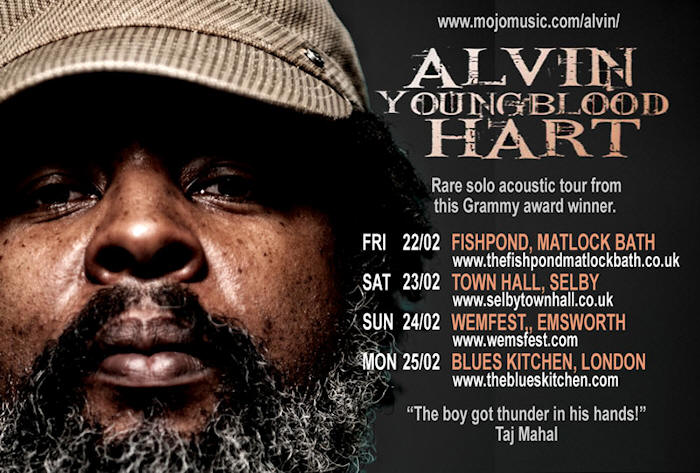
I caught up with
Alvin at the last gig of his short UK solo tour at
The Blues Kitchen, Camden,
London.
Alan: You
were born in Oakland, California, then your family moved to
Los Angeles, then Ohio, then finally settling in Chicago.
What were your earliest musical memories?
Alvin: One of
my earliest musical memories is my Bugs Bunny Ukulele which
had a music box and when I broke all the strings I put
rubber bands on it, and the Beatles cartoon show. I didn’t
see the Beatles on Ed Sullivan like everybody else because I
was only about a year old. Also, the band that lived up the
street from us when I was a kid called the D Dynamics. That
was a really cool name for a band back in the 60s. We used
to go up there during the daytime when I was about 3 or 4
years old. It was a family band and the younger of the
brothers used to let us come in the garage when he was
practicing and let us strum on his guitar a little bit, step
on the drum pedal. They were a pretty good little
neighbourhood band, they played The Beatles, Sly and the
Family Stone and whatever else was going on back in those
days.
Alan: You spent a fair
bit of time visiting your grandparents in Carrollton in
Carroll County Mississippi. That must have had a musical
influence on you?
Alvin: Well, the thing was, everybody assumes that because
my parents’ generation left the state of Mississippi that
they didn’t bring anything with them. They brought
everything with them, cultural things, music, food, so all
that was there anyway. Mostly what I did, soaked up in
Mississippi was just country living. My grandma was still
basically living in the 19th century even though
it was 1966.
Alan: Did
you always want to become a musician?
Alvin: I think
that was one of the things I wanted to be for sure. I was
always pretty athletic so I was in the various sports and,
yeah, just music. I liked the way the guitars looked when I
walked past the music store and pawn shops.
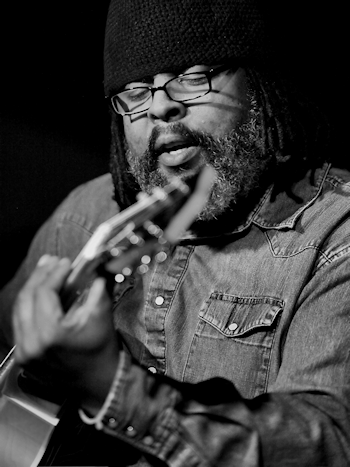 Alan: Who
has influenced you the most in your music writing and
playing? Alan: Who
has influenced you the most in your music writing and
playing?
Alvin: Err, I
don’t know. There was a lot of influence going on with
everything from James Brown to the James Gang, Leadbelly to
Led Zeppelin, just a ton of things, just good music man. A
big fan of Free when I was growing up – that was the first
time I heard the combination of a Marshall and a Les Paul
together, although I didn't know what it was. I was just 7
years old when Alright Now was on the radio and I was like,
“Wow, what is that? That is so cool, I want that!”.
Alan: Now,
it's well documented where you got your “Youngblood” name
from - the older musicians on Maxwell Street, Chicago, when
you used to playing guitar there with them.
Alvin: Yeah, I
was the youngest sibling as well, so it was just that I was
the youngster there.
Alan: Now,
the name Alvin, I read somewhere that it came from Alvin and
The Chipmonks, is that true?
Alvin: Nah! It
came from Alvin Lee, man! I had a guitar, like a Gibson
335, it was like the Japanese cheap version of the Gibson
335 with a bunch of stickers and stuff on it. And I had a
baseball hat with A on it. It was a good disguise!
Alan: Your
music goes beyond the confines of the blues including
elements of western swing, pop, reggae and rock. What is
your view of the blues as a music genre and do you regard it
more as 'world music'?
Alvin: I really
hate genres! It’s just become to be such a stifling thing.
If you ask about influences I have to say Bill Graham the
promoter because when he put on shows at The Fillmore and
stuff he’d get everybody, he’d have John Lee Hooker and
Cream on the same bill, Miles Davies and Blood, Sweat &
Tears. It got to a point where some people started to get a
little bit too serious about the whole genre thing and
particularly with like the blues thing. I think if you get
too serious it starts scaring the kids off.
Alan:
Certainly in England, a lot of the old blues festivals are
changing to Blues/Rock or even “Music” festivals, because it
covers everything.
Alvin: Yeah, it
starts to scare the kids off. When I was a teenager, man,
in the late 70s, I had the old cassette player, walking
around, hanging out with everybody else, I was the only kid
I remember in my peer group that was listening to Freddie
King. It was really cool because my friends might want to
go to a show and we’d go see something like Judas Priest or
UFO, then my brother would want to go to a show and we’d go
and see Albert King or something totally off the wall,
Stanley Clarke or something like that back in those days.
It was just really fascinating to me to see people playing
live music. How do I get to any level of proficiency?
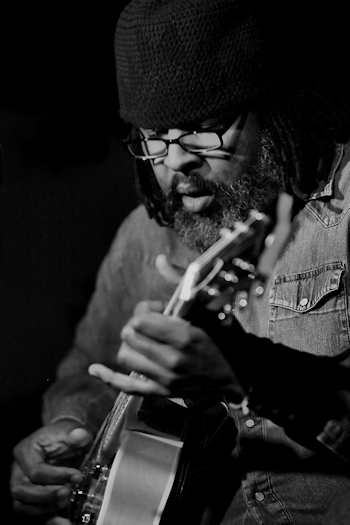 Alan: Are
there any particular songs that you play that have special
meaning to you? Alan: Are
there any particular songs that you play that have special
meaning to you?
Alvin: All of
em! Or I wouldn’t play them! Of course the songs you
write, you have to play those, but the songs I didn’t write,
it’s always been like whether or not to perform this song.
It’s based on whether or not you feel a connection with the
song and if you think you’ll be able to do a proficient job
with it.
Alan: Now
your first album, Big Mama's Door was all blues. Was
that intentional to start there "doing your roots" and
broaden it out later, or was it just how you felt at the
time?
Alvin: Well,
what was going on, in the early-mid 90s was "Unplugged",
right. Everywhere was into that. That was my version of
"Unplugged" pretty much. I think it worked out okay and it
was sort of unique in that “whatever it was” sort of folk
music that I grew up on. It just so happened to be that was
my foot in the door in the music business.
Alan: That was
a big foot! You did well!
Alvin: It
wasn’t big enough!
Alan: Now I've got to pick
up on the one track on Big Mama's Door, the beautiful
rendition of Pony Blues. No doubt you're a Charlie Patton
fan; how did you go about tackling his complex guitar style
– did you work it out yourself, or did you pick it up from
somebody else?
Alvin: I don’t
know what I’ve managed to tackle but whatever I did with it,
I just kind of worked it out myself, man.
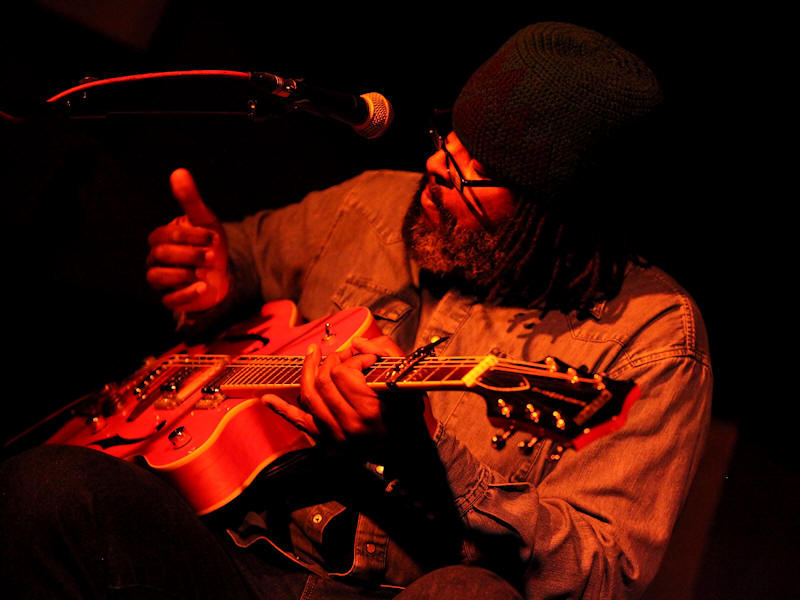
Alan: Do
you try to get close to Charlie's original or do you tone it
down for modern audiences.
Alvin: I just
do things differently. Sometimes I put in things that are
specific to my own existence, poetic licence or whatever it
is.
Alan: Your
second album 'Territory' continuing the blues tradition but
extending into western swing, ska, blues-rock - who or what
inspired you to 'broaden your musical horizons' at that
time?
Alvin: They
were already broad! But it was time to make a record and I
didn’t really want to do the "Unplugged" record again.
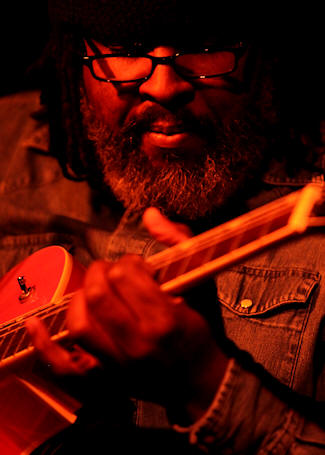 Alan: In
2004 you received a Grammy Award for your contribution to
the Stephen Foster tribute album 'Beautiful Dreamer: The
Songs of Stephen Foster' - the track Nelly Was A Lady.
How did that come about? Alan: In
2004 you received a Grammy Award for your contribution to
the Stephen Foster tribute album 'Beautiful Dreamer: The
Songs of Stephen Foster' - the track Nelly Was A Lady.
How did that come about?
Alvin: Largely,
luck of the draw. There’s a thing with that whole awards
thing to where I think a lot of it is just name
recognition. Not my name, but that record was a compilation
with a lot of names on there. The voting members of the
academy; they were looking for something. I can’t remember
but I think it won something like the Best Folk category and
the people in the voting membership of the recording
academies are probably going to go for what I would call the
lowest common denominator, whatever, the low hanging fruit.
They are going to see a name on there they recognise and
they are going to think, oh yes, let’s pick that. There were
a lot of other names, like Alison Krauss, Raul Malo from the
Mavericks, a lot of names to recognise on there you know.
Alan: Now
in 2005 you released the self-produced 'Motivational
Speaker' album - you've claimed that's your favourite
album, why's that your favourite?
Alvin: Well,
it’s that some of the songs on there I’d written before I
made the record and I’d got to know those songs really well,
and liked them a lot. I just thought it was a good
representative of me musically.
Alan: In
2006 you were a guitar tutor to Samuel L. Jackson for his
role in the film Black Snake Moan, and you also
recorded a duet with the film's female lead Christina Ricci
This Little Light Of Mine, which I read was left on
the cutting room floor?
Alvin: Yeah,
big Hollywood moment. It’s in the movie, but it's just
that I’m not in the movie. There’s a scene where the two of
them are together singing a folk song ... This Little Light
of Mine ... and I’m playing guitar on that.
Alan: Do
you get the credit?
Alvin: I think
so, yeah!
Alan: In
2007 you toured with Bo Diddley, in what I understand turned
out to be his last tour, that must have been some
experience?
Alvin: It
wasn't quite his last but it was close to it. It was late
2006 when I was with Bo. That was great, you couldn’t have
told me when I was a kid that I’d be on the road with Bo
Diddley at some point playing guitar and maracas with him.
It was really good, for me it was kind of a weird thing, a
lot of those old timers, they get their handlers doing
things for them that they shouldn’t be doing in a musical
sense, hiring the band. I didn’t think that particular band
had a real grasp of Bo, I don’t think they were students of
Bo Diddley and they didn’t really get his legacy and so
after about a week on the road in a 4 or 5 week tour, they
were some personnel changes in the Bo Diddley Band. It was
Ruthie Foster, myself and Bo Diddley; so Ruthie would start
the show off solo, then toward the end of her set the house
band (Bo’s Band) would join her for a couple of songs and
I’d join her for a couple as well. Then I would play with
the house band for a set and then Bo would come out and stay
out there and play some excellent guitar. When I got
drafted to fill in that other guitarist’s slot I went out
and got some maracas because this is Bo Diddley and that's
part of the thing, man. The first night’s sound check after
I’d brought in the maracas was funny because I was playing
an open tuned guitar and maracas at the same time and he
just turned around, looked over his shoulder and yeah, we
got to be pretty good friends then. We found out that each
of us liked to go pawn shopping; he liked to go and look for
silver, rings and silver ware and stuff and I’d go looking
for guitar stuff.
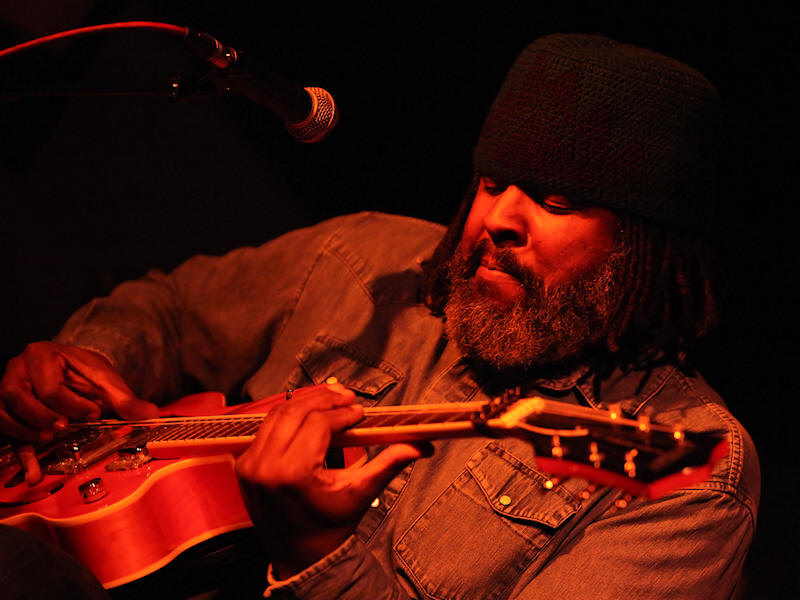
Alan: In
2008 you had your silver screen debut as 'Juke Joint
Musician No. 1' in Denzel Washington's The Great Debaters;
any more plans to be a film star and carry on that career?
Alvin: Well,
that's right. Every film I work on I always ask the
Director, when are we going to get together and do that
Western or something like that? Yeah, If I’m asked again,
I’ll do it. It’s not something I really actively seek you
know. That role wasn’t really much of a stretch. I just
had to act like a musician!
Alan: Also
in 2008 you played with Gary Moore and original Thin Lizzy
drummer Brian Downey, and a year later toured with Gary in
Germany I believe, that was a good experience for you?
Alvin: It was
great. I’d been a Lizzy fan since I was 13. I met Gary
actually through Otis Taylor when I was doing this banjo
tour in England with Otis Taylor and Gary came to my show
and we just kind of hit it off. It wasn’t too long after we
were playing a festival I think, maybe up in Leicester, and
my band was on the bill and Gary was headlining that night,
so he was kind of hanging around and watching our set and he
asked me to sit in with him that night and then later on I
got a call that he wanted us to come and open a tour for him
in Germany. That was good fun, he’d come out there every
night watching our set from the wings and have me come back
to his dressing room and have a Guinness and tell Lizzy
stories.
Alan: You
mentioned Otis Taylor; you played on the “Recapturing The
Banjo” album. Any more projects with Otis?
Alvin: No, but
there’s always something with Otis. He’ll come up with some
other idea and give me a call. The door’s always open with
Otis. Well, the door’s half open, or half closed, I don’t
know which.
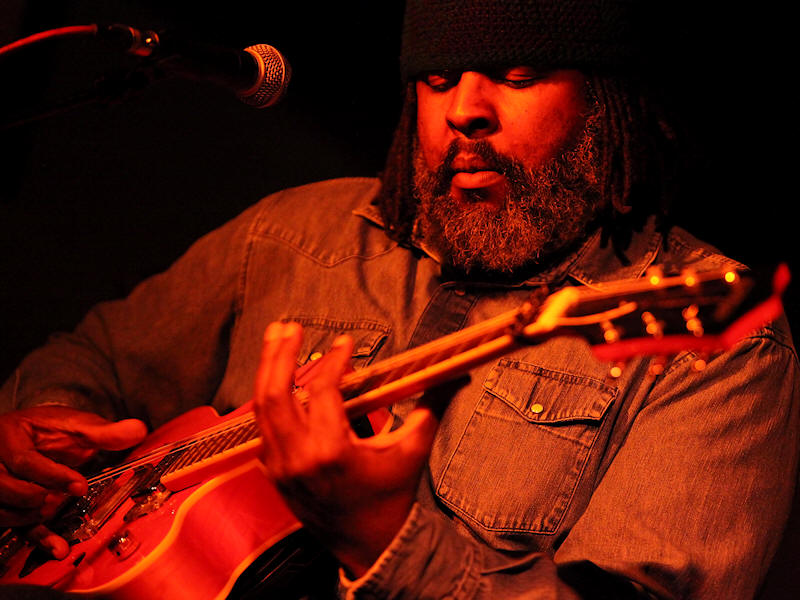
Alan: You've got this
'acoustic super group' The South Memphis String Band, with
Luther Dickinson and Jimbo Mathus; how did that come about?
Alvin: We’ve
all known each other for a few years and we just play around
in different situations so we thought we’d do something a
little bit different and do something together for a
change.
Alan: So,
that’s separate from the North Mississippi Allstars?
Alvin: Yeah.
We went out and did a couple of tours and records. We’ll
probably get it together again at some point, it’s just
another outlet.
Alan: You
recently did some gigs with Luther and Cody Dickinson as the
Mississippi Mudbloods backing Ian Siegal, are we going to
see you in that guise again?
Alvin: Yeah. We
keep having a few schedule conflicts. I would have done a
trip with him in November but I had some things in the
States that I could not get out of. And then I had a little
health problem through the summer, a little knee issue, so I
wasn’t sure what I could do or when. They are going to do
another tour in the spring I think but I’m going to miss
that one. It sounds like Ian's record is getting a little
action. It’s good.
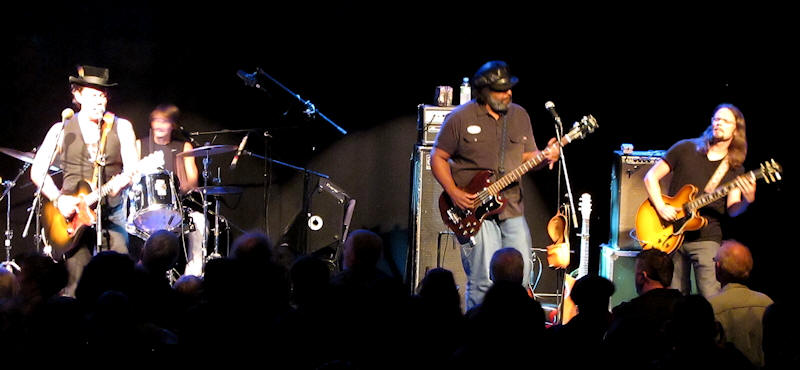
Ian
Siegal, Cody Dickinson, Alvin Youngblood Hart and Luther
Dickinson at Bury Met gig, 6th July 2012
Alan: Now
my friend Dai Thomas is an acoustic blues guitarist (and a
big fan of yours) who really enjoys playing Bass for therapy
and is really interested in that you seem quite at home
playing Bass in bands, do you ever sing lead while playing
Bass?
Alvin: It’s
more difficult than playing guitar because you are playing
single notes a lot of time, but I do sometimes. I think I
sung lead on a couple on the Mudbloods’ tour. Sometimes
Luther and I do some performances with different people
where we switch off playing guitar and bass. Yeah, it’s a
difficult undertaking and you’ve got to Sir Paul [McCartney]
full credit man, for doing the things he did were amazing.
When I was first picking up the instruments I was, like,
wow, how do those guys sing and play at the same time? It’s
insane. But I finally got a little bit of a grip on it!
Alan:
Here's another question from my friend Dai; do you ever play
fretless or dog-house bass and which do you prefer?
Alvin: Nah,
I’ve never really played a fretless. I have mastered that
bridle-bit but I don’t really have anything going on there.
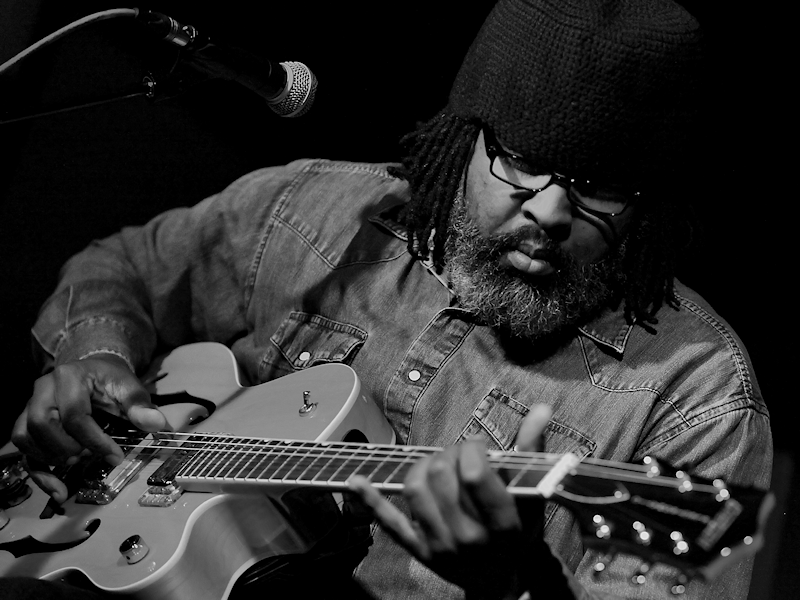
Alan: I
know that you’re into tinkering with old guitars, banjos,
mandolins, etc. Do you restore them to “as-new” or do you
just make them playable. Also, do you sell them on when
you’ve sorted them, or do you just keep them?
Alvin: Most
everything I would do would just be for myself, things I
wanted to play. That’s how I got started on all that
anyway. I would see pictures of 20s and 30s musicians and
there instruments didn’t look like the ones you buy off a
rack nowadays so I was like, well where are they and I found
out that a lot of them were, not so much poorly made, but it
was a long time for them to survive and you’d find 70 year
old guitars and they’d need to be rebuilt. I kinda learned
how to do that. I was an electronics technician in the US
coastguard where I learned to work on valve radio
transmitters which was basically like working on a giant
guitar amp so I’d build a lot of amps and things like that
Alan: Any
albums in the pipeline?
Alvin: Well,
hopefully, the whole record making thing is changed so
drastically anyway. I made Motivational Speaker
record for a label who claimed, yeah, we are going to use
our publicity machine, blah blah and they made the record,
the next thing you know they are bankrupt so now I don’t
think you can buy that record as a hard CD anymore, you can
only buy it as a download now. So I’m hoping to just kind
of be careful with who I make any kind of deals with or not
with any next thing that I do. Next week I’m talking with my
engineer friend and we’re going to try something unusual,
different. We did kind of come from the tail-end of old
school recording, you know the last days of tape and all
that. We’re going to try recording some stuff on cassette
tape in the future and see how that sounds. The funny thing
was I listened to the four track cassette demos of songs I
did for Motivational Speaker and I swear they
actually sound better than the record sounds. It’s worth
looking into.
Alan: Alvin, many thanks for your time.
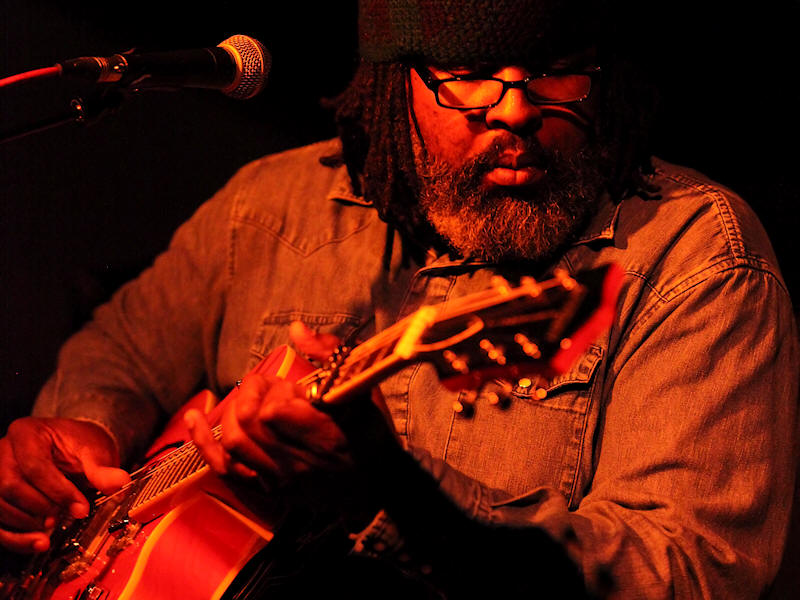
________________________________________________________________________________________________________________
|